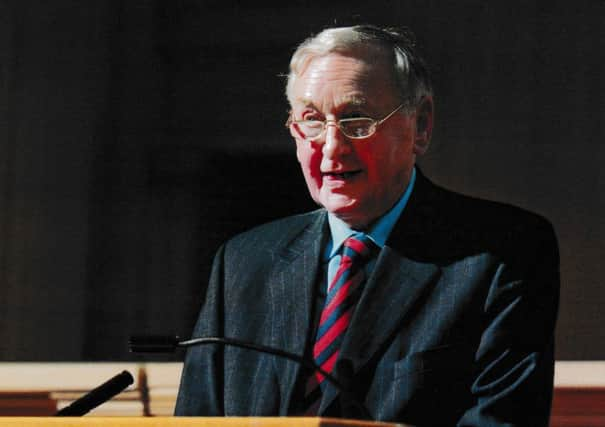Obituary: David McWalter Millar, civil servant


David McWalter Millar was born to respected Edinburgh surgeon, Thomas (Tommy) Millar and nurse, Margaret (Molly) Jones. Educated at Melville College, where he was head boy, he became life-long friends with the late John P Mackintosh and spent summers from 1944-46 in discussion together while bicycling around the Youth Hostels of Scotland. These discussions were instrumental in both their future trajectories, Mackintosh becoming Professor of Politics at Edinburgh University and MP for East Lothian and Berwickshire and Millar playing a significant part in the work of three parliaments over his lifetime.
Millar read History at Edinburgh University and was a member of the Liberal Club and the Students’ Representative Council. He was one of a group of friends who took an active part in all sorts of university activities but who called themselves “The Apathetic Society”, reflecting Millar’s sense of fun and hospitable nature, as his enthusiasm for parliamentary democracy, the European project, sailing and family left little time for apathy. After University the “Apathetic Society” became a regular luncheon club and still survives to this day.
Advertisement
Hide AdAdvertisement
Hide AdMillar chose to complete his National Service in the Education Corps of the RAF being stationed in Germany and returned to a position as a Clerk in the House of Commons, where he was highly regarded by colleagues and Members of Parliament and provided expert support to several Select Committees of the House and to individual Members. Millar was passionate about the role of parliament in holding the executive to account and saw his role as being to support members to understand and to use the procedures of the House to frame and target their questions most effectively. He met and married (Helen) Josephine Hamilton, also from Edinburgh, in London in 1965.
As UK membership of the EEC was confirmed in 1973, opportunities arose for British civil servants to join the staff of the European Parliament in Luxembourg. One of Millar’s first roles involved working on the introduction of direct elections to the European Parliament, championing democracy for the European citizens in being to vote in or out their MEPs. In the Directorate of Research and Documentation, of which Millar was to become Director, he was able to extend the work he had done in the Commons to a European arena, providing invaluable information and guidance to MEPs in representing the voice of the population in European legislation. He spent the rest of his career there, living with his family in Luxembourg, and made many European friends.
On retirement, Millar was awarded the OBE for services in Luxembourg and returned to Scotland to a part-time post at the University of Edinburgh’s Europa Institute. There he produced a number of papers about the Maastricht Treaty and other developments in the European Union which were of great value to students and colleagues, helped to organise and participate in many conferences on European themes, and brought an insider’s knowledge to teaching the Honours courses on European institutions. He was very popular with the students and colleagues, who appreciated his enthusiasm, extensive knowledge and willingness to share his time.
He had always been a keen supporter of devolution, though not independence, and following the report of the Scottish Constitutional Convention in the early 1990s realised that their general principles needed operationalising.
This lead to the publication of an influential pamphlet entitled “To Make the Parliament of Scotland a Model for Democracy” in collaboration with the late Professor Sir Bernard Crick. This recommended a structure and procedures for a future Scottish Parliament, with a greater role for its committees, based on the European rather than the Westminster model with much of the discussion between the two men taking place in the garden of Millar’s Peebles home.
This was the basis for the structure and procedure eventually adopted for the Parliament when it was convened in 1997, including a Steering Committee to govern the use of parliamentary time without a government majority; standing committees which could propose bills and debate government legislation; the role of petitions and the Information Service; much of which is still in place today.
Millar’s influence also extended into the fabric of the Scottish Parliament as he suggested the John P Mackintosh quote which is inscribed on the threshold of the Dewer Room: “People in Scotland want a degree of government for themselves. It is not beyond the wit of man to devise the institutions to meet these demands”.
When he retired from the university, Millar felt deeply honoured to be awarded an Honorary Fellowship by his alma mater in recognition of his contribution to university teaching.
Advertisement
Hide AdAdvertisement
Hide AdMillar was also passionate about Liberal Democracy, only once being persuaded to stand in the European elections for the South of Scotland constituency, preferring to be a mentor, guide and supporter to many candidates and campaigners in his local Borders constituencies as well as delivering innumerable leaflets. An elder of his local church at Lyne and Manor, Millar is remembered by the congregation for his kindness and described as a true gentleman. He is survived by his wife Josephine, their two sons, Andrew and Neil and five grandchildren.